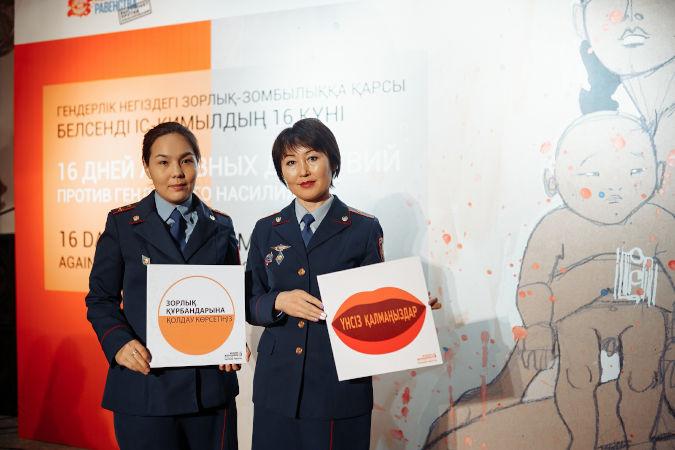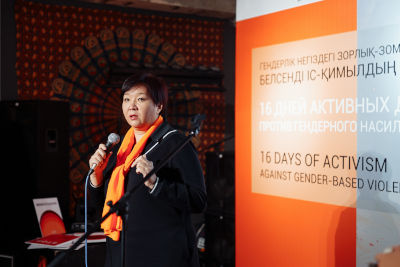Art against violence: exhibition on violence against women and girls opens in Nur-Sultan
Date:

A unique art exhibition on violence against women and girls opened in Nur-Sultan, the capital city of Kazakhstan on 29 November. The art exhibition was born out of the creative collaboration of the TSE Art Destination, which is a contemporary art gallery, educational centre and an experimental art lab, and the UN Agencies in Kazakhstan, led by UN Women.
The exhibition combines traditional works of art by Kazakhstani artists with a collection of modern digital illustrations, posters and graphics by artists from Central Asia, Europe and North America. The exhibition features work by Saule Duiysenbina, Medina Bazargaliyeva, Zharas Taken, Ansagan Mustafa, Aruzhan Zhumabek, Suinbike, Aisulu Shaikenova, Bakhyt Bubikanova and others.
“The artists, who contributed to the exhibition relate themselves to the issue of violence. For them, the exhibition is a way of facing their personal stories and sending a message that we should speak up about these issues,” says Dina Baitassova, Director of the TSE Art Destination.
For example, the story behind Saule Dyussenbina’s diptych “It’s me!” is about her friend Aigul, who was raped, killed and thrown from the 7th floor of a building in the new square. “All I got left from Aigul is a student ID and this photo. I rarely look at it, but each time I flip the photo, I see her handwriting and only two words 'It’s me!' with an exclamation mark. Sometimes I think to myself, 'I know that it’s you, I'm sorry that I forgot about you! And rarely think of you. Often it seems to me that I live two lives for myself and for you, and therefore I have so many, and therefore it's you, but it's also me'," reads the card next to the diptych at the gallery.
Violence impedes women's full participation in society and has long-term consequences for women, families, communities and countries. Violence against women and girls is a serious violation of human rights, and it remains widespread in Europe and Central Asia.
“The United Nations is committed to ending gender-based violence. We know that one in three women around the world experience violence of different forms, from physical assaults to harassment and rape - one of the most pervasive human rights violations. We must stand and act together to end this pandemic in the country, and in the world,” stated Gemma Wood, Head of UN Women Office in Kazakhstan at the art exhibition opening ceremony.

Rape is a physical form of violence against women and girls which is rooted in a complex set of patriarchal beliefs, power and control. This creates a social environment in which sexual violence is pervasive and normalized. Such “culture” is perpetuated with the use of misogynistic language, objectification of bodies, and glamorization of violence.
Confirming the exact figures for the number of rapes and sexual assaults is not easy, as often victims are afraid to talk about it. Approximately 15 million girls in the world (aged 15-19 years) at some point in their lives were forced to have sex or other sexual activities. According to the General Prosecutor’s office, in Kazakhstan, 1,450 rapes and cases of sexual acts were registered in 2018, of which 1,132 were against women and 231 against children.
“Don’t keep silent about violence. Don’t be afraid of telling your stories of violence. Don’t think that you are on your own and stop blaming yourselves. Violence is not a problem of a survivor, it is a problem of our society, which should not be tolerated,” concluded Dina Smailova, Director of the Public Foundation “NeMolchiKZ”.
The opening ceremony was also the venue for the presentation of the new poem called #NotoViolence by young Kazakh poet Dina Oraz and the artistic dancing performance by Kazakh National Academy of Choreography, depicting vicious circle of violence, existing in Kazakh society.